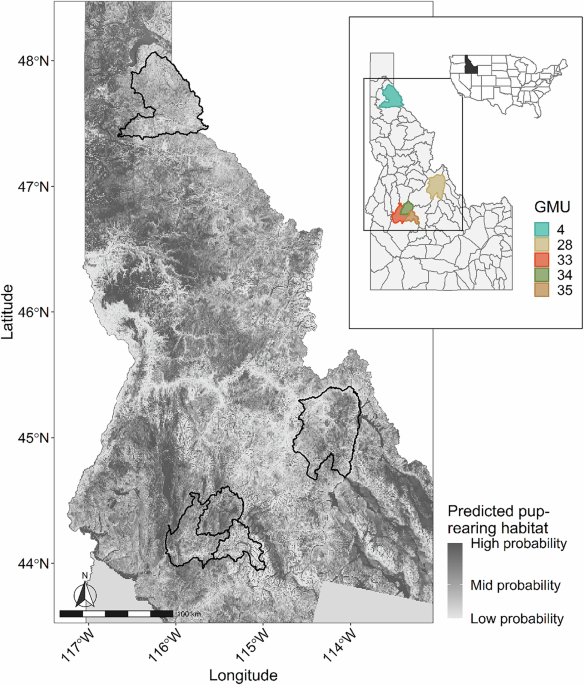Adams JR, Waits LP (2007) An efficient method for screening faecal DNA genotypes and detecting new individuals and hybrids in the red wolf (Canis rufus) experimental population area. Cons Genet 8:123–131
Adams LG, Stephenson RO, Dale BW, Ahgook RT, Demma DJ (2008) Population dynamics and harvest characteristics of wolves in the Central Brooks Range, Alaska. Wild Monog 170:25
Allendorf FW, Funk, WC, Aitken SN, Byrne M, Luikart G (2022) Conservation and the genomics of populations. Third edition. Oxford University Press, Oxford, UK
Ausband DE (2022) Inherit the kingdom or storm the castle? Breeding strategies in a social carnivore. Ethol 128:152–158
Ausband DE, Mitchell MS, Doherty K, Zager P, Mack CM, Holyan J (2010) Surveying predicted rendezvous sites to monitor gray wolf populations. J Wild Manag 74:1043–1049
Ausband DE, Rebholz PF, Petrillo L (2025) The effects of human-caused mortality on mammalian cooperative breeders: a synthesis. Biol Rev 100:149–157
Boyd DK, Ausband DE, Cluff HD, Heffelfinger JR, Hinton JW, Patterson BR, Wydeven AP (2023) North American wolves. In Hiller TL, Applegate RD, Bluett RD, Frey SN, Gese EM, Organ JF, editors. Wild furbearer management and conservation in North America. Wildlife Ecology Institute, Helena, Montana, USA. pp 32.1–32.68
Brown JH (1971) Mammals on mountaintops: nonequilibrium insular biogeography. Am Nat 105:467–478
Burnham, KP, Anderson, DR, 2002. Model selection and multimodel inference: a practical information-theoretic approach. 2nd ed. Springer-Verlag, New York, New York, USA
Chen N, Juric I, Cosgrove EJ, Bowman R, Fitzpatrick JW, Schoech SJ, Clark AG, Coop G (2019) Allele frequency dynamics in a pedigreed natural population. Proc Nat Ac Sci 116:2158–2164
Ekblom R, Brechlin B, Persson J, Smeds L, Johansson M, Magnusson J, Flagstad Ø, Ellegren H (2018) Genome sequencing and conservation genomics in the Scandinavian wolverine population. Cons Bio 32:1301–1312
Fuller TK, Mech LD, Cochrane JF (2003) Wolf population dynamics. In Mech LD, Boitani L, eds. Wolves: behavior, ecology and conservation. The University of Chicago Press, Chicago, IL, USA, pp. 161–191
Gobush K, Kerr BEN, Wasser S (2009) Genetic relatedness and disrupted social structure in a poached population of African elephants. Mol Eco 18:722–734
Harrington FH, Mech LD (1982) An Analysis of howling response parameters useful for wolf pack censusing. J Wild Manag 46:686–693
Hatchwell BJ, Komdeur J (2000) Ecological constraints, life history traits and the evolution of cooperative breeding. Anim Behav 59:1079–1086
Jones OR, Wang J (2010) COLONY: A program for parentage and sibship inference from multilocus genotype data. Mol Eco Res 10:551–555
Kokko H, Johnstone RA, Clutton-Brock TH (2001) The evolution of cooperative breeding through group augmentation. Proc R Soc B 268:187–196
Miller CR, Joyce P, Waits LP (2002) Assessing allelic dropout and genotype reliability using maximum likelihood. Genet 160:357–366
Mills, LS, 2013. Conservation of wildlife populations: demography, genetics, and management. Wiley-Blackwell, UK
Pacheco C, Rio-Maior H, Nakamura M, Álvares F, Godinho R (2024) Relatedness-based mate choice and female philopatry: inbreeding trends of wolf packs in a human-dominated landscape. Hered 132:211–220
Peakall R, Smouse PE (2006) GenAlEx 6: genetic analysis in excel. Population genetic software for teaching and research. Mol Eco Notes 6:288–295
R Core Team (2022) R: A language and environment for statistical computing. https://www.r-project.org/
Ross KG (2001) Molecular ecology of social behaviour: analyses of breeding systems and genetic structure. Mol Eco 10:265–284
Rubenstein DR (2007) Female extrapair mate choice in a cooperative breeder: trading sex for help and increasing offspring heterozygosity. Proc R Soc B 274:1895–1903
Schlaepfer DR, Braschler B, Rusterholz HP, Baur B (2018) Genetic effects of anthropogenic habitat fragmentation on remnant animal and plant populations: a meta-analysis. Ecos 9:e02488
Sillero-Zubiri C, Gottelli D, Macdonald DW (1996) Male philopatry, extra-pack copulations and inbreeding avoidance in Ethiopian wolves (Canis simensis). Beh Eco Socio 38:331–340
Solomon NG, French JA (1997) Cooperative breeding in mammals. Cambridge University Press, New York, NY, USA
Stansbury CR, Ausband DE, Zager P, Mack CM, Miller CR, Pennell MW, Waits LP (2014) A long-term population monitoring approach for a wide-ranging carnivore: noninvasive genetic sampling of gray wolf rendezvous sites in Idaho, USA. J Wild Manag 78:1040–1049
Stenglein JL, De Barba M, Ausband DE, Waits LP (2010a) Impacts of sampling location within a faeces on DNA quality in two carnivore species. Mol Eco Res 10:109–114
Stenglein JL, Waits LP, Ausband DE, Zager P, Mack CM (2010b) Efficient, noninvasive genetic sampling for monitoring reintroduced wolves. J Wild Manag 74:1050–1058
Stenglein JL, Waits LP, Ausband DE, Zager P, Mack CM (2011) Estimating gray wolf pack size and family relationships using noninvasive genetic sampling at rendezvous sites. J Mamm 92:784–795
U.S. Fish and Wildlife Service (2023) Species Status Assessment for the Gray Wolf (Canis lupus) in the Western United States. Version 1.2. Lakewood, Colorado. pp 362
VonHoldt BM, Stahler DR, Smith DW, Earl DA, Pollinger JP, Wayne RK (2008) The genealogy and genetic viability of reintroduced Yellowstone grey wolves. Mol Eco 17:252–274
Wang J (2011) Coancestry: A program for simulating, estimating and analysing relatedness and inbreeding coefficients. Mol Eco Res 11:141–145. https://doi.org/10.1111/j.1755-0998.2010.02885.x
Weaver JL, Fritts SH (1979) Comparison of coyote and wolf scat diameters. J Wild Manag 43:786–788
Western Regional Climate Center (2023) Historical climate information. [accessed 2023 Aug 31]. http://www.wrcc.dri.edu
Wikenros C, Gicquel M, Zimmermann B, Flagstad Ø, Åkesson M (2021) Age at first reproduction in wolves: different patterns of density dependence for females and males. Proc R Soc B 288:20210207

